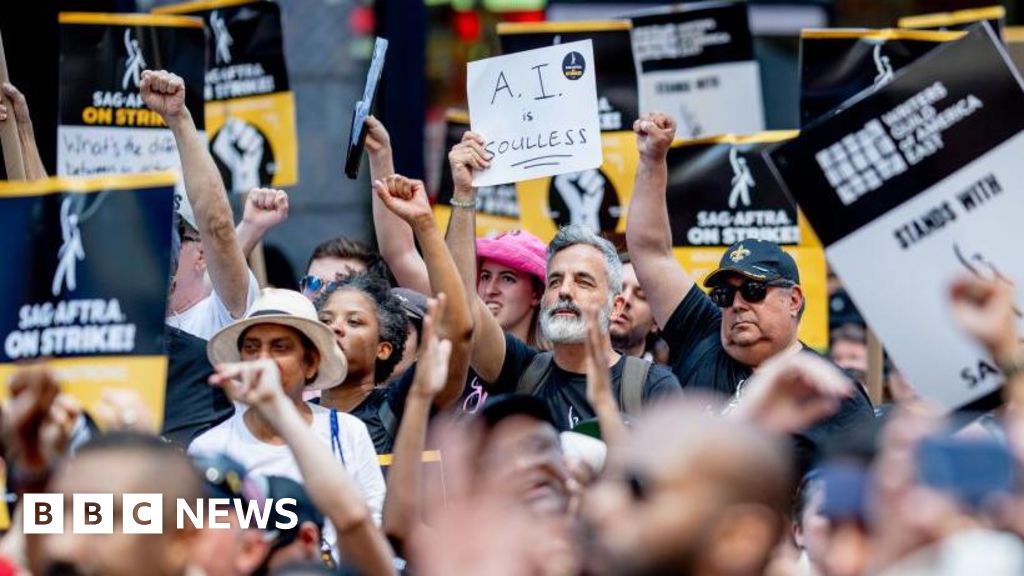The AI Revolution in Hollywood: How Technology Is Changing the Game
By Regan Morris, BBC News, Los Angeles
Picture this: a luxurious soundstage, once the playground of legendary silent film stars like Charlie Chaplin and Mabel Normand, now echoing with laughter and clinking cocktail glasses. Hollywood’s movers and shakers have gathered to celebrate what many are calling the most groundbreaking innovation since films started talking—AI-generated video. But is this technology a beacon of hope for cinema or a harbinger of its demise?
A Shift in the Wind
Just two years ago, a historic strike shut down Hollywood, with writers and actors rallying against the encroachment of AI on their creative turf. Contradictorily, AI is now making its way into television, movies, and even video games, with Oscar-nominated films already leveraging its capabilities. At a recent gala, hosted by Bryn Mooser, co-founder of Moonvalley, the conversations shifted from protests to possibilities. Mooser insists that while AI still carries a negative connotation, his company is working on a “clean” AI tool that compensates creators fairly.
Power at the Table
One thing is clear: creators need to be at the forefront of AI development. As Mooser rightly points out, “it’s better to build the tool for filmmakers rather than get rolled over by big tech companies.” In a world where AI has often been portrayed as the ultimate villain—think The Terminator—it’s the tech companies that seem to face the backlash. Many are criticized for using publicly available data, often without permission, to train their AI models.
OpenAI and Google currently face multiple lawsuits from writers, actors, and news organizations claiming their work was misappropriated to develop AI without consent. Studios like Disney and Universal have yet to take a stand legally, despite pleas from writers to protect their intellectual property.
AI Streaming into Cinema
The seeds of AI’s potential in Hollywood are already sprouting. Films like Emilia Perez and The Brutalist have integrated AI for voice alterations, marking a new era of filmmaking where even the likes of Adrian Brody have depended on AI for accent adjustments. Imagine Tom Hanks and Harrison Ford being de-aged through this technology—it’s all happening!
The rapid growth of AI has not gone unnoticed. Just last month, OpenAI hosted an AI film festival, and industry giants Joe and Anthony Russo intend to invest $400 million to develop innovative AI tools for filmmakers.
Job Security at Stake?
But what about the impact on jobs? The conversation around job security looms large, with fears that AI could replace roles traditionally filled by humans. ChatGPT highlights background actors as the most vulnerable to replacement. However, A-list actors and directors still carry the allure that may protect their roles.
At a lively event in Silver Lake, jazzed executives mingled, eager to discuss the prospects of AI. While many were reluctant to go on record, an executive shared, “We’re here to learn… We’re not signing anything or buying anything, but we’re interested.”
Mooser believes this technology will democratize filmmaking, opening doors to budding creatives who lack big studio backing—letting undiscovered talent shine like Tarantino or Scorsese.
The Bigger Picture
As discussions swell, there is also an impending policy battle. Breaking news from the Trump administration points toward a new AI plan that could change the landscape. Tech companies argue that they need broad access to copyrighted works to compete globally, pushing for the designation of these creative works as “fair use” for AI training.
Hollywood, however, cries foul, stating that these changes could undermine an industry responsible for millions of jobs. A group of over 400 A-list talents, including stars like Ben Stiller and Cate Blanchett, recently penned an open letter to the administration emphasizing the importance of protecting creative industries while advancing AI.
Actor DW McCann expressed concerns outside a Disney office, stating, “Using actual actors is the key to a lot of the drama and enjoyment that people get from video games.”
Concluding Thoughts
As we navigate this new terrain, the sentiment among many is mixed. While some champions of AI envision profound advancements in storytelling, others remain skeptical, fearful of losing their livelihoods to cold algorithms. The crux of the conversation lies in ensuring that human artistry remains central to any technological progress.
With talented creators and innovative tech developers collaborating, the future could hold brilliant possibilities. “This technology is utterly meaningless without the artist at the center of it,” says Mooser.
The AI Buzz Hub team is excited to see where these breakthroughs take us. Want to stay in the loop on all things AI? Subscribe to our newsletter or share this article with your fellow enthusiasts.




